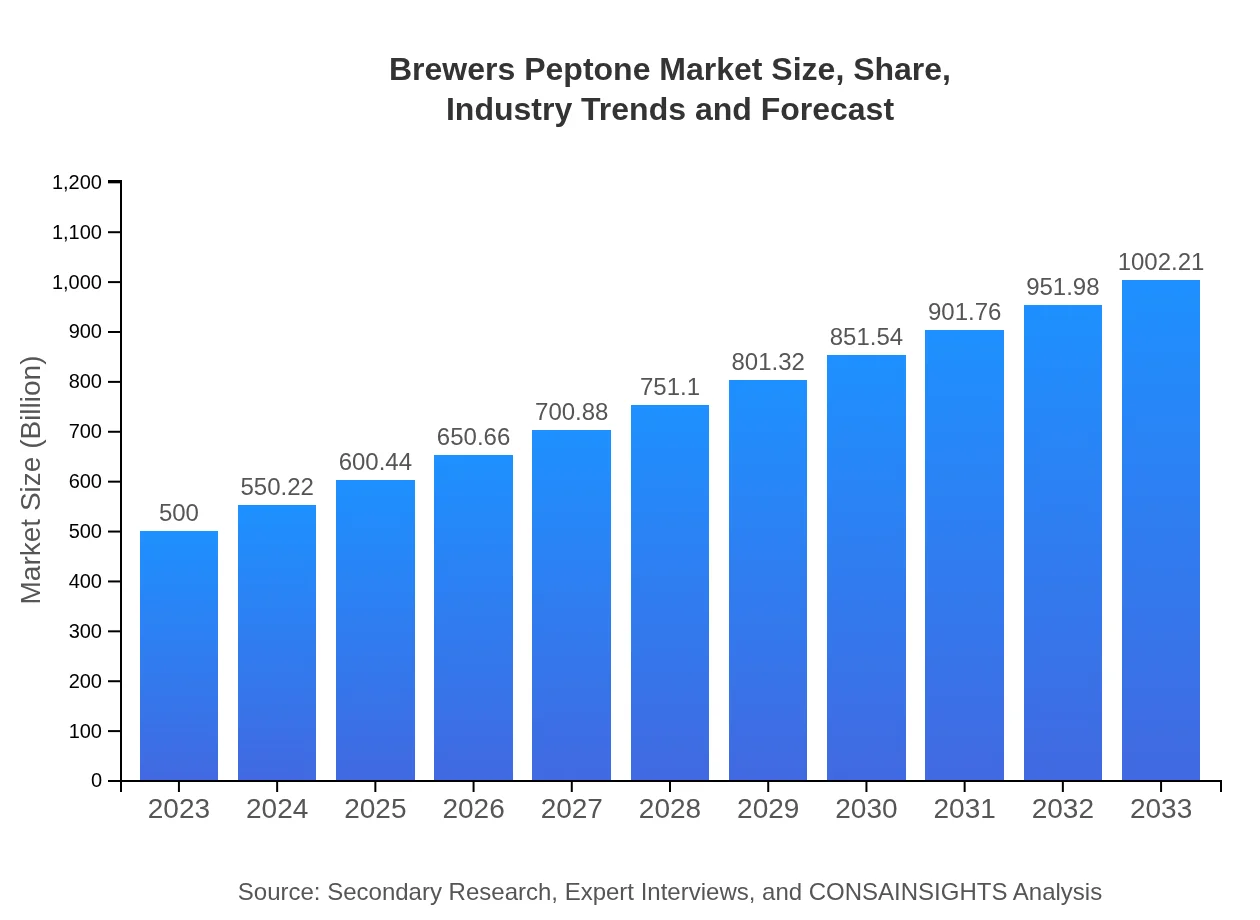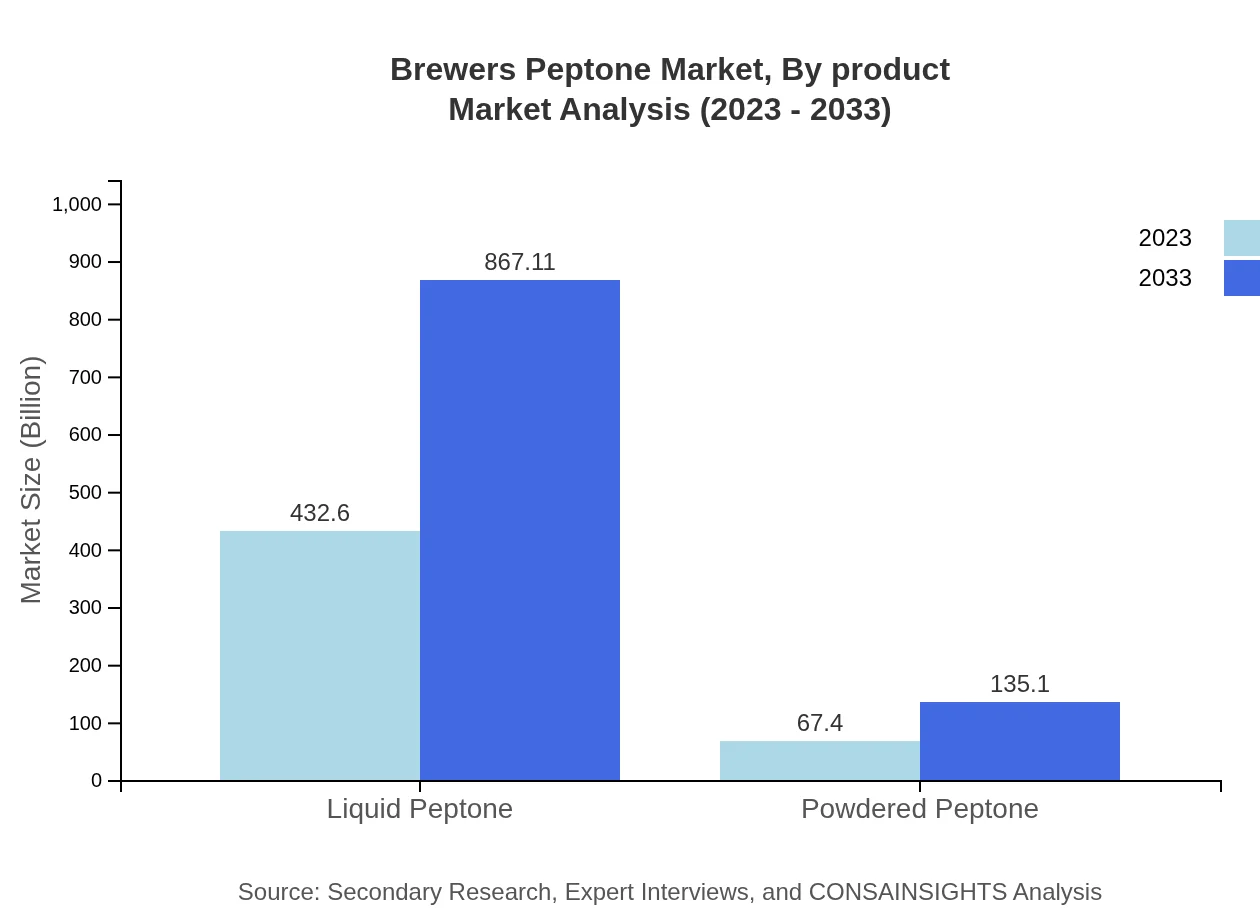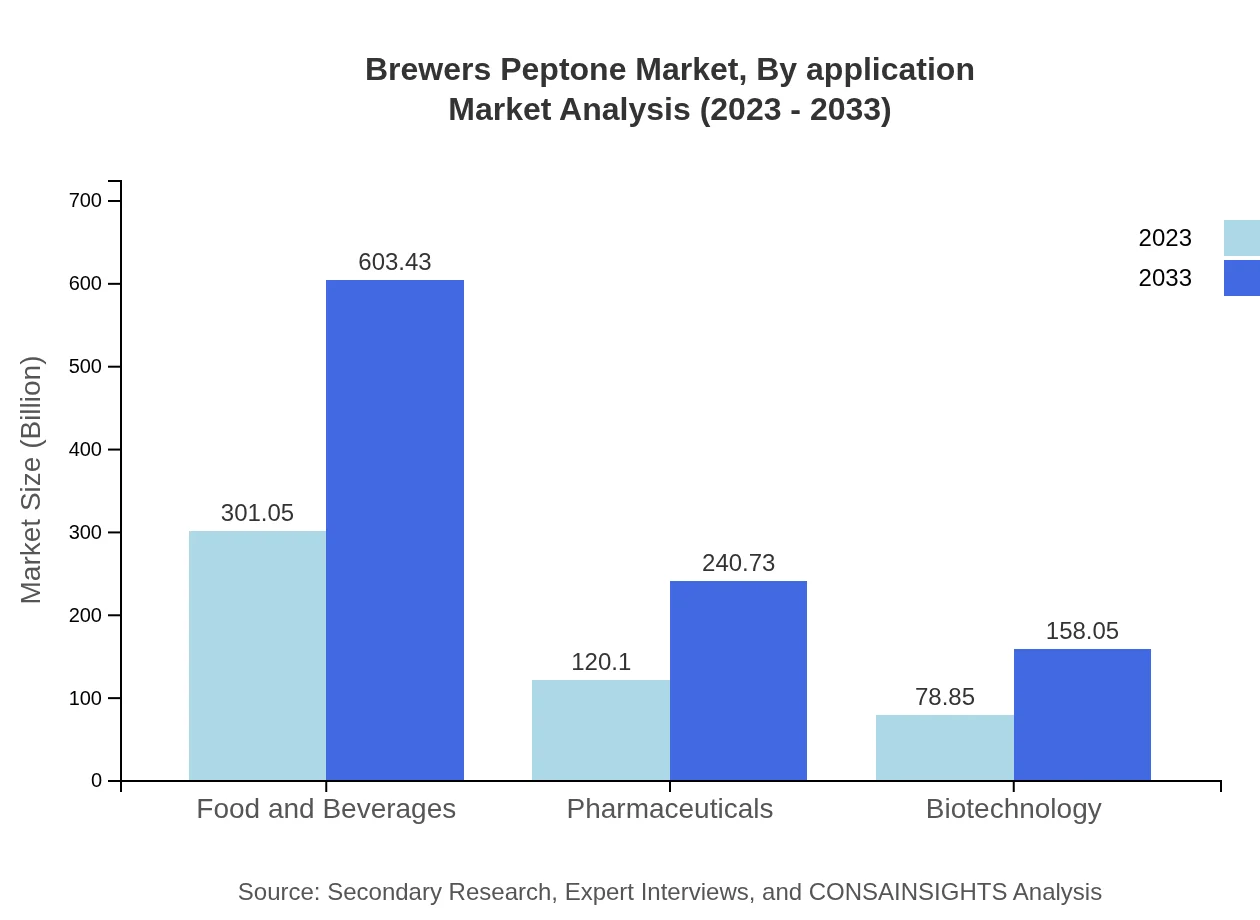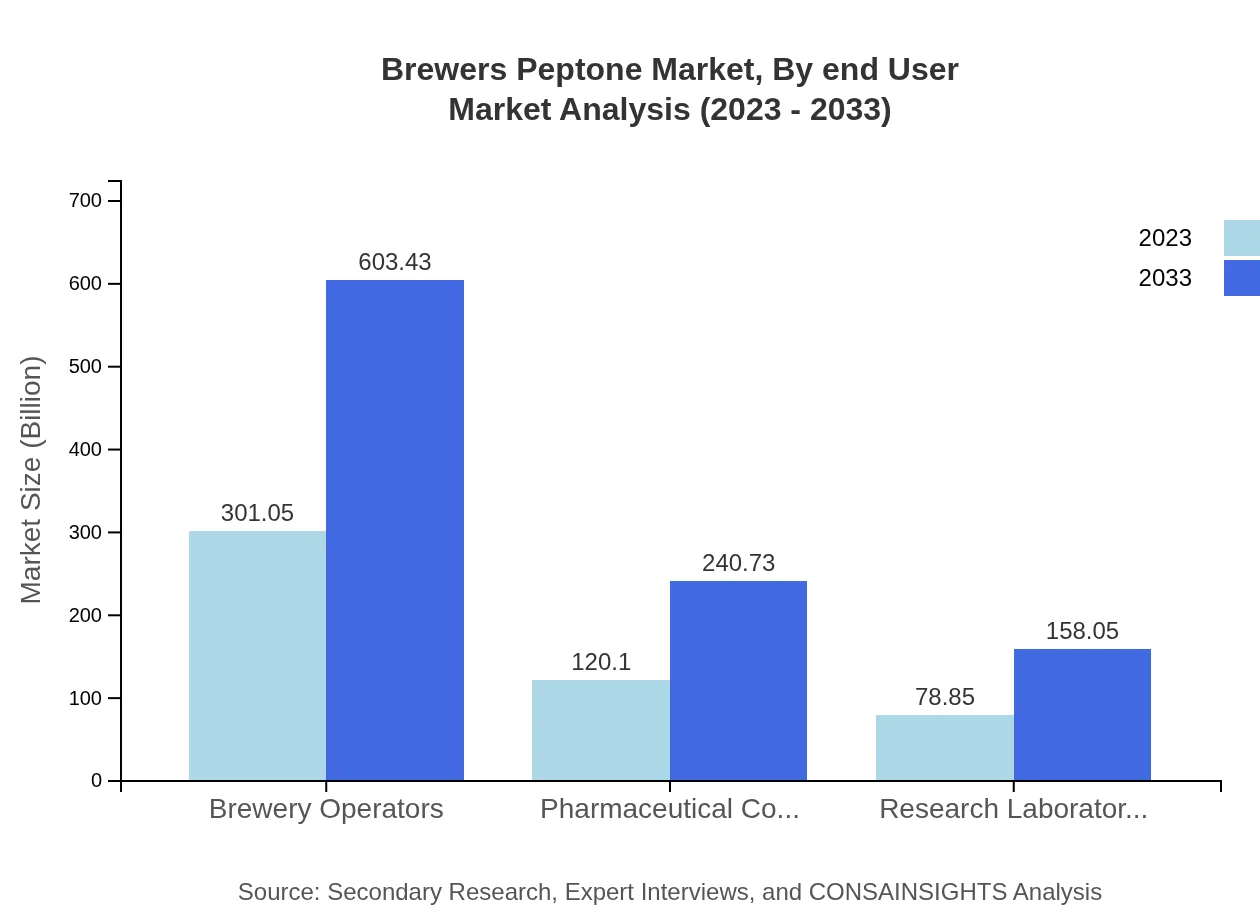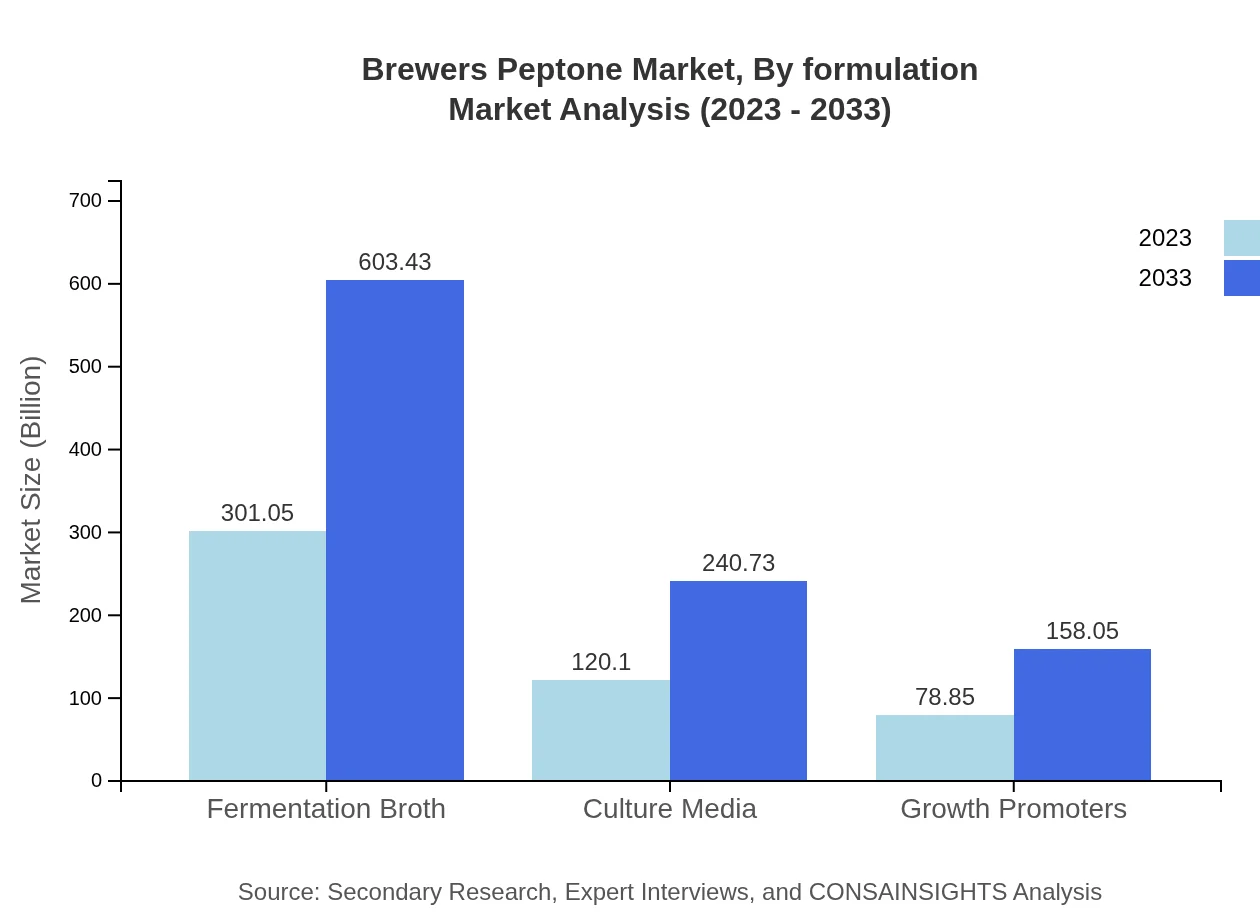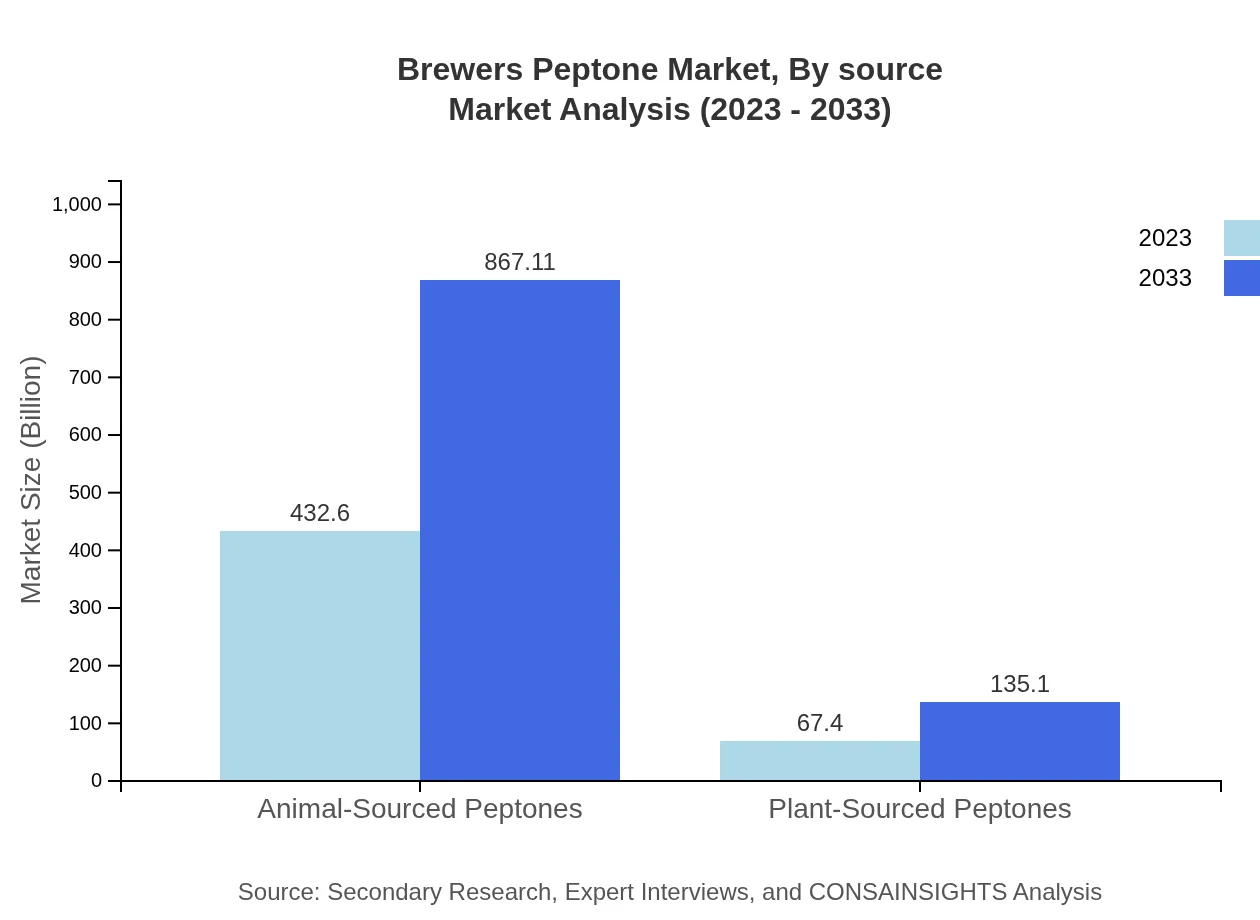Brewers Peptone Market Report
Published Date: 31 January 2026 | Report Code: brewers-peptone
Brewers Peptone Market Size, Share, Industry Trends and Forecast to 2033
This report provides an in-depth analysis of the Brewers Peptone market, focusing on market size, growth trends, segmentation, and future forecasts for the period 2023 to 2033. It aims to provide valuable insights into key market drivers, technological advancements, and competition.
| Metric | Value |
|---|---|
| Study Period | 2023 - 2033 |
| 2023 Market Size | $500.00 Million |
| CAGR (2023-2033) | 7% |
| 2033 Market Size | $1002.21 Million |
| Top Companies | VWR International, Merck Group, Fisher Scientific, SAB Biotherapeutics |
| Last Modified Date | 31 January 2026 |
Brewers Peptone Market Overview
Customize Brewers Peptone Market Report market research report
- ✔ Get in-depth analysis of Brewers Peptone market size, growth, and forecasts.
- ✔ Understand Brewers Peptone's regional dynamics and industry-specific trends.
- ✔ Identify potential applications, end-user demand, and growth segments in Brewers Peptone
What is the Market Size & CAGR of Brewers Peptone market in 2023?
Brewers Peptone Industry Analysis
Brewers Peptone Market Segmentation and Scope
Tell us your focus area and get a customized research report.
Brewers Peptone Market Analysis Report by Region
Europe Brewers Peptone Market Report:
In Europe, the Brewers Peptone market is poised to grow from USD 156.95 million in 2023 to USD 314.59 million by 2033. European countries are notable for their stringent quality standards in food production, positively affecting the market.Asia Pacific Brewers Peptone Market Report:
In 2023, the Brewers Peptone market in the Asia Pacific is valued at USD 97.15 million, projected to reach USD 194.73 million by 2033. The region benefits from a growing biotechnology sector and increasing investments in food technology, driven by an expanding population and rising disposable incomes.North America Brewers Peptone Market Report:
North America's market size reached USD 169.30 million in 2023, with expectations of doubling to USD 339.35 million by 2033. The region exhibits a robust demand for Brewers Peptone, fueled by advances in biotechnology and pharmaceutical sectors.South America Brewers Peptone Market Report:
The South American Brewer's Peptone market is valued at USD 11.35 million in 2023 and is expected to grow to USD 22.75 million by 2033. Demand is bolstered by a burgeoning food and beverage industry that increasingly seeks fermentation aids in product development.Middle East & Africa Brewers Peptone Market Report:
The Middle East and Africa market is projected to grow from USD 65.25 million in 2023 to USD 130.79 million by 2033, as regional growth in the food and beverage sector continues, accompanied by increasing microbial applications in health and nutrition.Tell us your focus area and get a customized research report.
Brewers Peptone Market Analysis By Product
In the Brewers Peptone market, both animal-sourced and plant-sourced types hold significant shares. The popularity of animal-sourced peptones will remain strong due to their high efficacy in promoting microbial growth in fermentation processes, while plant-sourced peptones are gaining traction for ethical and sustainability concerns.
Brewers Peptone Market Analysis By Application
The application segment remains diverse, spanning areas like food and beverages, pharmaceuticals, biotechnology, and research laboratories. Each segment demonstrates unique growth drivers, with food and beverage applications being the largest market segment due to the high demand for fermentation in alcoholic and non-alcoholic beverages.
Brewers Peptone Market Analysis By End User
End-users of Brewers Peptone include brewery operators, pharmaceutical companies, and research laboratories. Brewery operators constitute a significant portion due to their extensive use of peptones in yeast cultivation for brewing processes, enhancing the quality and consistency of end-products.
Brewers Peptone Market Analysis By Formulation
Brewers Peptone is primarily available in liquid and powdered forms, with liquid peptones dominating due to their ease of mixing and higher solubility. However, powdered forms are favored in applications requiring long shelf life and stable storage.
Brewers Peptone Market Analysis By Source
Sources of Brewers Peptone include both animal and plant origins. Animal-sourced peptones are renowned for their superior nutritional values, while plant-sourced peptones are increasingly recognized as viable alternatives driven by trends in vegan and sustainability-conscious consumers.
Brewers Peptone Market Trends and Future Forecast
Tell us your focus area and get a customized research report.
Global Market Leaders and Top Companies in Brewers Peptone Industry
VWR International:
VWR International is a key supplier in the Brewers Peptone market, offering a range of peptone products used in microbiological techniques, contributing to advancements in fermentation and bioprocessing.Merck Group:
Merck Group is known for its innovative biotechnology solutions, including high-quality Brewers Peptone products aimed at supporting various applications in food, beverage, and pharmaceutical sectors.Fisher Scientific:
Fisher Scientific, a part of the Thermo Fisher Scientific family, supplies a wide range of biotechnology supplies including Brewers Peptone, catering to the growing needs of research and development in the life sciences.SAB Biotherapeutics:
SAB Biotherapeutics specializes in the biotechnology sector, providing effective Brewer's Peptone solutions that enhance microbial growth and fermentation efficiency, targeting various market applications.We're grateful to work with incredible clients.









FAQs
What is the market size of brewers Peptone?
The brewers-peptone market is currently valued at approximately $500 million in 2023, with a projected CAGR of 7% from 2023 to 2033, indicating substantial growth in demand and market expansion over the next decade.
What are the key market players or companies in the brewers Peptone industry?
Key players in the brewers-peptone industry include major manufacturers such as Sigma-Aldrich, Thermo Fisher Scientific, and BD Biosciences, among others, who play critical roles in production and innovation.
What are the primary factors driving the growth in the brewers Peptone industry?
The growth in the brewers-peptone industry is driven by increased demand from pharmaceuticals, biotechnology sectors, and the rising use of peptones in laboratory applications to enhance microbial growth and fermentation processes.
Which region is the fastest Growing in the brewers Peptone market?
North America is the fastest-growing region in the brewers-peptone market, with a market size projected to increase from $169.30 million in 2023 to $339.35 million by 2033, reflecting significant growth opportunities.
Does ConsaInsights provide customized market report data for the brewers Peptone industry?
Yes, ConsaInsights offers customized market report data tailored to specific needs in the brewers-peptone industry, allowing clients to gain insights as per unique market demands and business requirements.
What deliverables can I expect from this brewers Peptone market research project?
Clients can expect comprehensive deliverables including detailed market analysis, regional insights, segment performance data, competitive landscape assessments, and actionable recommendations to inform strategic decisions.
What are the market trends of brewers Peptone?
Current market trends for brewers-peptone include a rising preference for plant-sourced peptones, increased applications in fermentation technology, and a strong focus on research and development in pharmaceutical products.

